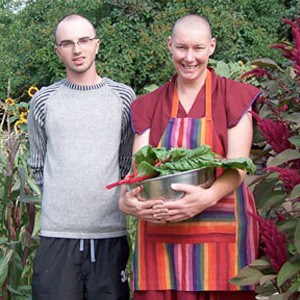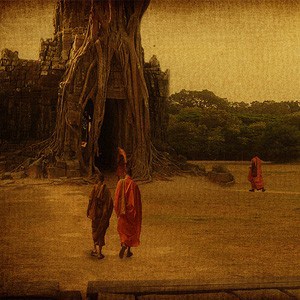Living in monastic community
A talk given during Sravasti Abbey's annual Exploring Monastic Life program in 2006.
Keeping precepts (continued)
- Classification of vows continued from Session 4
- Lapses
- Asking for things that are considered medicine
- Rules of deportment
- Seven ways of resolving conflicts
- Not supposed to do astrology, fortune telling, divination, and agricultural work
- Disciplinary procedures for certain misbehavior
Exploring Monastic Life 2006: Session 6, 1-3 (download)
Organization of the sangha
- Procedures
- Decision-making: Consensus
- Hierarchy
- Preserving harmony
Exploring Monastic Life 2006: Session 6, 2-3 (download)
Joining the community
- Responsibilities in taking ordination and participating in the harmony of community
- Questions and answers
- Astrology/divination
- Sexual advances
- Precept of not walking alone
Exploring Monastic Life 2006: Session 6, 3-3 (download)
The responsibility of a fully ordained monastic and the importance and role of a sangha community
Excerpt from session 6 teaching
The Buddha set up the sangha in a particular way and when you take ordination, you are joining a community. I think many people, especially those in the Tibetan tradition, don’t realize this. They think, “I’m taking these precepts from my teacher. It’s just between me and my teacher.”
It’s not. We are joining a community. We become part of a community. We have a responsibility to the other people in the community. We are responsible for the continuation of the teachings. We are not just doing our own trip.
And I think, for me, this was the big difference between novice ordination and full ordination. When I was a novice—I think this is quite natural, when you are a novice—I think: “I want to practice the Dharma. How can I practice the Dharma? What situation is good for me to practice the Dharma in? Where can I get teachings? Where can I practice in a good situation?”
As a novice, your main concern is your own practice. And sometimes we can get really stuck in this: “My practice. What’s the best situation for me to practice in and for me to live in?” Everything is about me and my practice.
I think when you take full ordination, what comes very clearly is that it is not about me and my practice. Rather, it is about the existence of the Dharma in the world. And to make the Dharma exist in the world, I have to learn it and I have to practice it. So of course my practice is important, but it’s important not because it is my practice, but because it helps the Dharma to exist in the world. It contributes to the benefit of society.
When you’re younger, you never think like that. But when you take full ordination, it’s like now you’re a full member of the sangha and it’s: “Wow! I have this opportunity because people for 2,600 years have followed these precepts and done this training. There’s this whole wave of positive energy of the continuation of the ordination and I just kind of grabbed my surfboard and went on it.” So when you’re junior, it’s like: “Whoa, now I’m on it! I’m going to try and stay on my surfboard.”
But then after a while, it’s like: “No, I’m responsible for the wave continuing! It’s not about me staying on my surfboard; it’s about this wave continuing because the Dharma has so much incredible potential to benefit so many beings. And for it to exist, I have to study and I have to practice, but I also have to help the community exist, because the community is really the one that passes on the Dharma to the future generations.”
If you look at the history of Tibet or China, whenever there was a persecution of the sangha, the Dharma declined in that place. In Tibet it was in the 8th century with King Landarma. When he persecuted the sangha and made people disrobe, the Dharma degenerated. There were small pockets of people practicing here and there, but you couldn’t gather together as a big group. Everybody was in their small pockets teaching their own disciples secretly, and of course then people’s own opinions came into the teachings, their own way of doing things. Monastic ordination ceased because of the persecution and the Dharma really degenerated.
And that’s why to rejuvenate it, some Chinese monks were asked to come and join the Tibetan monks to give the ordination again, and that is also why Lama Atisha and a whole host of other people were asked to come to Tibet to teach—to rejuvenate the Dharma after that period of persecution.
The same thing happened in Chinese Buddhism. I think there was a persecution of the sangha in the 9th century by a king of the Tang dynasty. By breaking the system of the sangha—making people leave the monastery—you had degeneration of the teachings.
Look what happened in Tibet with the Chinese occupation. First thing they do is they get rid of the sangha communities, then the Dharma degenerates, because you don’t meet together and practice together and give the teachings.
And so that’s one of the reasons for saying that the flourishing of the Dharma in a particular place depends on the existence of a sangha community of four or more fully ordained people. That is because they carry out the procedures and bring more people into the community and function as a community.
It is different when the laity, the people in society see a community vs. when they see one person. They don’t have that much interest in one person. They may see you at the airport or park or something and they come and talk to you, but that’s about it. There’s no place for them to go to, because you’re just one person. Whereas if there is a community, there is a place for them to go to. There’re all these role models. They see all these people who are dedicating their life to the life of the Dharma, and they get really inspired.
A community is also very important in terms of karma. We as one individual, we may have a lot of good karma but we don’t necessarily have the karma to make teachings happen. How often can we go to a teacher and say: “I want to learn something” and expect them to teach us privately? Not very often. Happens once in a while but not very often. You need the collective karma of the sangha, the monastic community, so that you can have teachings.
It is the same with respect to receiving support. What do you see in the West? Individual sangha members here and there. People don’t want to support an individual sangha member! They look at you and they say: “Okay, you’re ordained. Go out and get a job. Why should I go to work and support you so that you can meditate? Go do something!”
As an individual, we’re not that inspiring and people aren’t necessarily going to support us. But when there’s a group of monastics living together, practicing together, then people look at that group and they see the community and they feel really inspired, and they say: “I want to support that. I want to help this group to be able to practice so that more people can join the group and join in their virtuous activities.”
Are you seeing what I mean? The power of the community in terms of the positive potential we create, in terms of receiving teachings, even in terms of receiving financial support—we can see this using the analogy of the broom vs. one piece of straw. Acting as a beacon in this degenerate world by really trying to live ethically. And you see this happening, that even if people can’t come here, they feel good knowing that this place exists.
We ourselves feel the same way too. If you think of the big monasteries in India or Tibet or Taiwan or whatever place and you think of a group of people practicing together, you feel inspired. Well, that’s how people are going to look at us and why it’s so important to have a community and not just be isolated individuals doing our own trips in various places, because the Dharma is not going to continue like that. It just isn’t. It’s going to get fractured and splintered and there won’t be a systematic body of teachings that gets passed down. Rather, this person will teach this and that one will teach that, and this one doesn’t quite agree with that one, so he only teaches this, and so on. You already see it happening.
So it’s the power of the community acting together. That’s why there’re these guidelines for how procedures are supposed to be done and why harmony in the community is so important. And of course harmony in the community doesn’t mean that you stuff down everything and pretend you’re being harmonious when inside you’re really angry about what everybody else is doing. It involves learning how to communicate. But it also involves, at a certain point, giving up our own way, our own ideas and just going with it, because we trust the wisdom of the people who are practicing together.
Venerable Thubten Chodron
Venerable Chodron emphasizes the practical application of Buddha’s teachings in our daily lives and is especially skilled at explaining them in ways easily understood and practiced by Westerners. She is well known for her warm, humorous, and lucid teachings. She was ordained as a Buddhist nun in 1977 by Kyabje Ling Rinpoche in Dharamsala, India, and in 1986 she received bhikshuni (full) ordination in Taiwan. Read her full bio.


